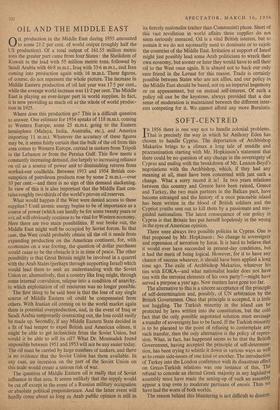OIL AND THE MIDDLE EAST
OIL production in the Middle East during 1955 amounted to some 21.2 per cent. of world output (roughly half the US production). Of a total output of 161.55 million metric tons the greater part came from four States : the Sheikdom of Kuwait in the lead with 55 million metric tons, followed by Saudi Arabia with 46.8 m.m.t., Iraq with 33.6 m.m.t., and Iran coming into production again with 16 m.m.t. These figures, of course, do not represent the whole picture. The increase in Middle Eastern production of oil last year was 17.5 per cent., while the average world increase was 11.2 per cent. The Middle East is playing an ever-larger part in world supplies. In fact, it is now providing as much oil as the whole of world produc- tion in 1925.
Where does this production go? This is a difficult question to answer. One estimate for 1954 speaks of 118 m.m.t. coming to Western Europe, some 25 m.m.t. going to the Eastern hemisphere (Malaya, India, Australia, etc.), and America importing 11 m.m.t. Whatever the accuracy of these figures may be, it seems fairly certain that the bulk of the oil from this area comes to Western Europe, carried in tankers from Tripoli in the Lebanon or from the Persian Gulf. This flow meets a constantly increasing demand, due largely to increasing reliance on oil as a source of power and to diminishing returns from worked-out coalfields. Between 1953 and 1954 British con- sumption of petroleum products rose by some 2 m.m.t.—over 10 per cent.—and there is no sign of this demand slackening. In view of this it is also important that the Middle East con- tains roughly two-thirds of the world's proven oil reserves.
What would happen if the West were denied access to these supplies? Until atomic energy begins to be of importance as a source of power (which can hardly be for some twenty years or so). oil will obviously continue to be vital for Western economy. Here there are two main possibilities. If war broke out, the Middle East might well be occupied by Soviet forces. In that case, the-West could probably obtain all the oil it needs from expanding production on the American continent, for, with economies on a war footing, the question of dollar purchases would cease to be the obstacle it is in time of peace. The other possibility is that Great Britain might be involved in a quarrel with the Arab States (perhaps through supporting Israel) which would lead them to seek an understanding with the Soviet Union or, alternatively, that a country like Iraq might, through some internal convulsion, relapse into a condition of anarchy, in which exploitation of oil resources was no longer possible.
The first thing to be said here is that the loss of any single source of Middle Eastern oil could be compensated from others. With Iranian oil coming on to the world market again there is potential overproduction, and, in the event of Iraq or Saudi Arabia temporarily contracting out, the loss could easily be made up. Secondly, if any Middle Eastern State decided in a fit of bad temper to expel British and American oilmen, it might be able to get technicians from the Soviet Union, but would it be able to sell its oil? What Dr. Moussadek found impossible between 1951 and 1953 will not be any easier today. The oil must be carried by large numbers of tankers, and there is no evidence that the Soviet Union has them available. In any case, an incursion on the part of the Soviet Union on this scale would create a serious risk of war.
The question of Middle Eastern oil is really that of Soviet influence in that area. It seems unlikely that the supply would be cut off except in the event of a Russian military occupation or absolute political preponderance. And the latter event will hardly come about as long as Arab public opinion is still in its fiercely nationalist (rather than Communist) phase. Short of this vast revolution in world affairs these supplies do not seem seriously menaced. Oil is a vital British interest, but to sustain it we do not necessarily need to dominate or to cajole the countries of the Middle East. Irritation at support of Israel might just possibly lead some Arab politicians to wreck their own economy, but sooner or later they would have to sell their oil to the West once again. It is absurd not to back our only sure friend in the Levant for this reason. Trade is certainly possible between States who are not allies, and our policy in the Middle East should be based, not op an imperial hegemony or on appeasement, but on mutual self-interest. Of such a policy oil can be the keystone, always provided that a due sense of moderation is maintained between the different inter- ests competing for it. We cannot afford any more Buraimis.


































 Previous page
Previous page